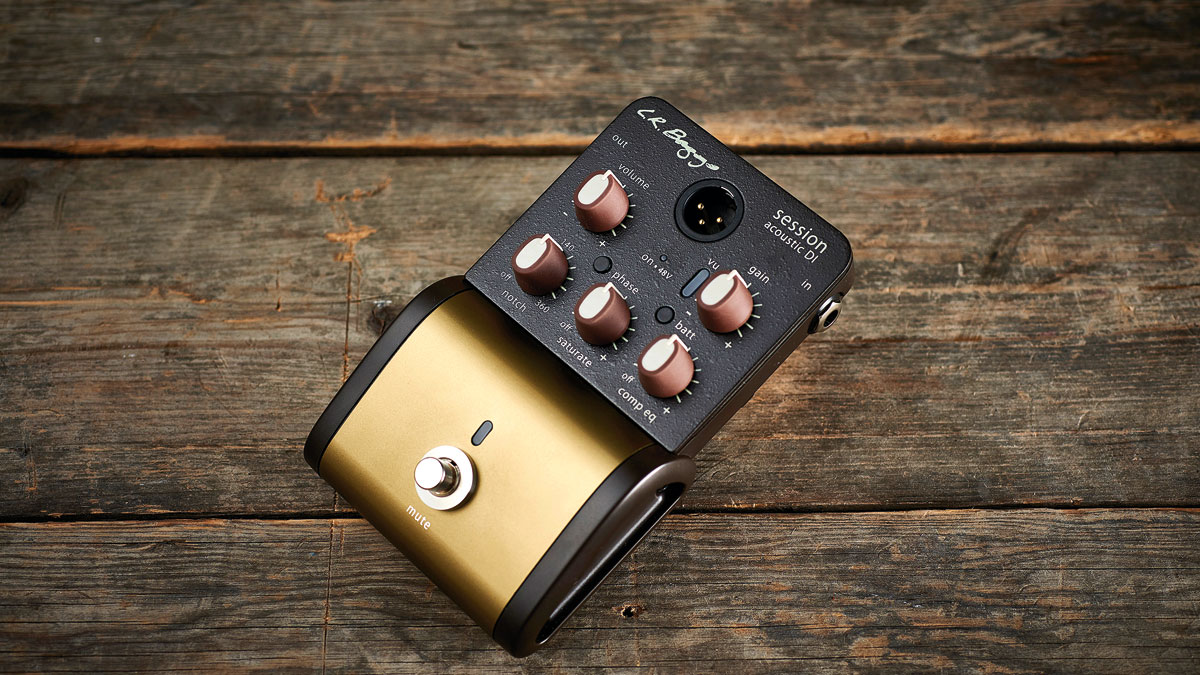MusicRadar Verdict
Quality mastering in a pedal with feedback rejection? That's about the size of it. Niche, but very nice.
Pros
- +
Best in class performer.
Cons
- -
Expensive. Too subtle for some.
MusicRadar's got your back
The Session Acoustic DI shares much DNA with the Venue DI, which retails at £315 and features four-band EQ, notch filter, phase switch, onboard tuner with large LED display, mute and adjustable boost functions, effects loop and various jack and XLR connection possibilities.
The Acoustic DI also has a similar bronze/ brown metal-shrouded design, yet is under half the footprint. The gently curved lower section houses the sturdy metal on/mute footswitch (there is no bypass) with power-supply input on the right-hand side, although it'll also run on a nine-volt block battery or phantom power.
The top half mounts the controls, all with those tactile rubber knobs with clear position markers: volume (output), gain (input level with LED VU display and battery check), notch filter, saturate and comp EQ.
There's a phase switch, too, which can alter the low-end characteristic and is also the first stage of feedback rejection, plus XLR balanced output and standard jack in and out.
On the upper left side is a ground-lift slide switch. On the right side is a four-position high-pass filter switch, which attenuates your low end with a choice of four shelving points: 40, 80, 120 and 200Hz.
Sounds
Unlike the Swiss Army knife concept of the Venue DI, however, the Session Acoustic DI's role is more specifically aimed. "Inspired by the LR Baggs Handcrafted Video Sessions and our experience in some of Nashville's great studios," says LR Baggs, "the Session Acoustic DI brings our signature studio sound to your live rig."
So, while the volume, gain and notch controls are all straightforward, the 'tricks' lie with the saturate and comp EQ controls.
The former aims to emulate the sort of analogue saturation, which, as LR Baggs explains, is "often used by studio engineers in post-production: saturation adds warmth, dimension, and pleasing harmonics while smoothing the signal for an enhanced mix."
"The comp EQ alone might be a reason to buy this pedal."
Comp EQ, meanwhile, "features three narrowly focused bands of compression that tame common problematic frequencies: the low, mid, and high frequency compressors are essentially 'touch-sensitive' EQs that respond in real-time to your dynamics. The harder you strum, the more they compress and vice versa." Okay?
Using a variety of both steel- and nylon- string guitars (although we don't think this is designed specially for the latter type), the Session DI initially seems to provide quite a subtle effect. Starting with the saturate control, you definitely hear an increase in the thickness right across the frequency range, but centred, seemingly, on quite a wide midrange.
It might seem at odds with a typical mid-scooped modern electro sound, but we'd favour a less-is-more use of this control unless you do want to evoke some almost tape-like saturated distortion, which we certainly managed.
The comp EQ alone might be a reason to buy this pedal. Introducing it from the off position, it's subtle, but you notice a progressive swell to the decay and a softening of the attack that's certainly an enhancement.
For many, this is going to prove simply too expensive and too subtle, but when it's not there, you miss it. It's easily the best single-knob compressor for acoustic guitar we've encountered: the notch filter is superb and the saturate control, used sparingly, adds just the right kind of colour.
Dave Burrluck is one of the world’s most experienced guitar journalists, who started writing back in the '80s for International Musician and Recording World, co-founded The Guitar Magazine and has been the Gear Reviews Editor of Guitarist magazine for the past two decades. Along the way, Dave has been the sole author of The PRS Guitar Book and The Player's Guide to Guitar Maintenance as well as contributing to numerous other books on the electric guitar. Dave is an active gigging and recording musician and still finds time to make, repair and mod guitars, not least for Guitarist’s The Mod Squad.
“If they were ever going to do the story of Nero, probably the most decadent of all the emperors, they would have to use Roy Thomas Baker”: Tributes to the legendary producer of Queen, Alice Cooper, Journey and more
“Built from the same sacred stash of NOS silicon transistors and germanium diodes, giving it the soul – and snarl – of the original”: An octave-fuzz cult classic returns as Jam Pedals resurrects the Octaurus
What’s the buzz? Meet Yellowjacket, Cherry Audio's recreation of EDP’s trend-setting Wasp from 1978











